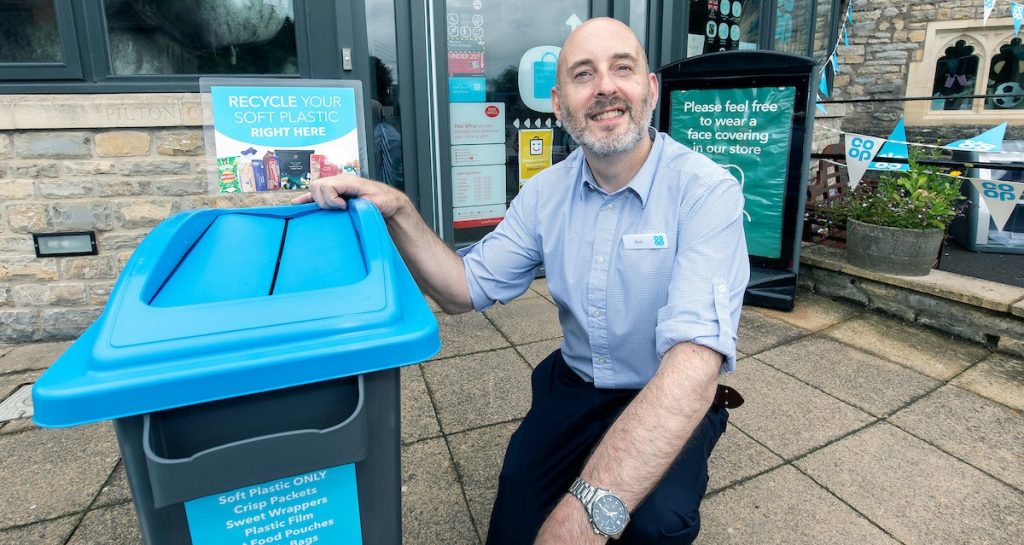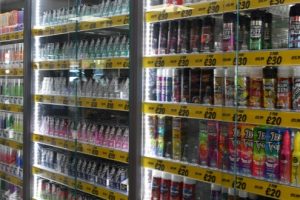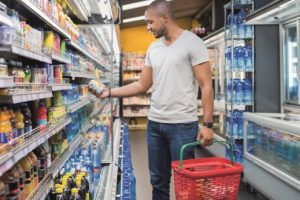The study wants to help create the “ultimate environment” for soft plastic recycling.
The village’s 1000 residents will be engaged and educated in how to collect all their soft plastic and shown how easy it is to recycle all food packaging.
A unique “Recycling Behaviour Change Board” will be involved in the project, including famous faces, scientists, behaviour specialists and consumers designed to bring together a collective understanding on how to support recycling.
Research by the Co-op shows that while 92% of people are committed to recycling, nearly half of UK adults (49 percent) admit putting items in their home recycling bins that they are unsure can be recycled.
Co-op’s study highlighted that nearly 70% of adults know they could (and want) to have a better attitude to recycling.
The research adds that nearly a third believe they can recycle soft plastics at home but that most local authorities cannot recycle soft plastic.
Earlier this month Co-op rolled-out Europe’s most extensive in-store recycling scheme for soft-plastics, ensuring that all of its food packing is now recyclable, either in-store, or through kerbside collections – it will even accept soft plastic wrapping purchased at other retailers.
The initiative established an accessible disposal route for materials which are unlikely to be collected by UK councils, including: crisp packets, bread bags, single-use carrier bags and bags-for-life, lids from ready meals and yogurt pots, biscuit wrappers and pet-food pouches.
It will be available in 2,300 Co-op stores by November.
Sara Cox, presenter, DJ and Recycling Behaviour Change board member, said: “We all know that it is important to do our bit when it comes to recycling.
“However, even when we do set out with all the best intentions, it’s difficult to know what can and can’t be collected, and the truth is that many of us are getting it wrong or feel that recycling is a futile task.
“I’m taking on the role as a Recycling Behaviour Change Board member because I want to help everyone to learn how simple it can be to collect soft plastics at home and return them to their local Co-op store.”
Iain Ferguson, environment manager at the Co-op, said: “As a business we are committed to supporting simple solutions to everyday environmental issues.
“The launch of our in store soft-plastic recycling scheme is designed to simplify recycling for consumers, but we know that as a business there is more we can do to make long-term positive changes to the consumer behaviours in the communities we serve.
“We are excited to find out what we can learn from the experiment, and how we can put those learnings into action nationally.”
Mathew Tavener, manager of Co-op’s Pilton store, said: “The initiative has really opened my eyes, and we have had such a great response from the community already.
“Personally I didn’t realise how much soft-plastic I used and that I wasn’t recycling myself.
“It isn’t much extra effort to recycle it – it does take a change in behaviour and then it just becomes a habit, one that we can all do, simply.
“As a father of a three year-old son myself, it really does make you realise that we can all make small changes, that together, add up to making a big difference, especially if we are to have an environment that we are proud to pass on to the next generation.”
Results of the Pilton study will be released and shared later in the year in a bid to create long-lasting behaviour change to help consumers navigate the plastic kerb-side collection lottery across the UK.
 Talking Retail Grocery and product news for independent retailers
Talking Retail Grocery and product news for independent retailers






